Archive for the 'history' Category
Saturday, December 3rd, 2016
“I keep thinking there’s a beach at the end of this,” a friend said. “An island, and we’ll be happy again.”
His mother left yesterday after his cremation and when I walked her to the cab, she said to me: ‘I think the reason I was put on earth was for these last two months.’”
One cannot expect people to live in a state of perpetual horror and outrage. Eventually they subside. Fatigue sets in, burnout, boredom, acceptance—and the attention span turns to something else. How could it be otherwise? Yet all of this is strange.
Posted in bookmaggot, grief, history | Comments Off on more from chronicle of a plague, by andrew holleran
Friday, December 2nd, 2016
You’re worse than evil. You’re inefficient.
Posted in bookmaggot, history | Comments Off on penric’s mission, by lois mcmaster bujold
Sunday, November 27th, 2016
But what has it all got to do with the dog, exactly? My friend Victor stayed with me for the first week of Widowhood II. When at last he went off to juggle the shards of his own dwindling immunity, and I woke to a smudged October morning, my first thought wasn’t Oh poor me, about which I had already written the book, but rather: Who’s going to take care of Puck?
Posted in grief, history, mindfulness, the end of all things | Comments Off on last watch of the night, by paul monette
Sunday, November 27th, 2016
…we have lost a whole generation of gay men, who might otherwise have been valuable mentors to their successors.
I began to read books about other epochs in history when people had been subjected to cruel and unusual catastrophes. The Black Death was the most obvious…
It appears in the midst of the most ordinary circumstances—like the man on that same beach, who, in the middle of a cloudless summer afternoon, turned to my friend and said, “What is the point of going on?” (“To bear witness,” my friend responded.) The Fear is there all the time, but it comes in surges, like electricity—
Posted in grief, history | Comments Off on chronicle of a plague, by andrew holleran
Saturday, November 26th, 2016
Our family commitment to each other is not forced, but desired; our marriages are not arranged for economic benefit or social duty; our children are chosen and beloved, not incidental and taken for granted.
I was overwhelmed, it was all too much for me, how could it not have been? I wanted to run away, I wanted it to be over. I’m sorry. I wish, I wish, I wish every single day that I had been more genuinely kind, more open and loving and freely generous. Although if it happened again, someone I know having AIDS —and it has, it will —I’d do it again and feel the same, because that’s what AIDS does, the fucker.
You have to call him, you have to be persistent and annoying. He doesn’t have to like you. I finally learned life’s lesson: They don’t have to like you.
Posted in bookmaggot, grief, history | Comments Off on hospital time, by amy hoffman
Thursday, November 24th, 2016
It’s Embarrassing Sincerity Day in California (when isn’t it) so you should know that if you’re reading this I am grateful for you. I am grateful for Barack and Michelle Obama. I’m grateful for California and its badass Reps and Senators and state legislature. I’m grateful for San Francisco, my sanctuary city. Today and every day I am grateful for my queer and trans friends, my immigrant friends, my friends who are people of color, my disabled friends, my friends who teach, and my friends who care for the sick and dying. This is my America and it’s worth fighting for. Here is a pavlova.
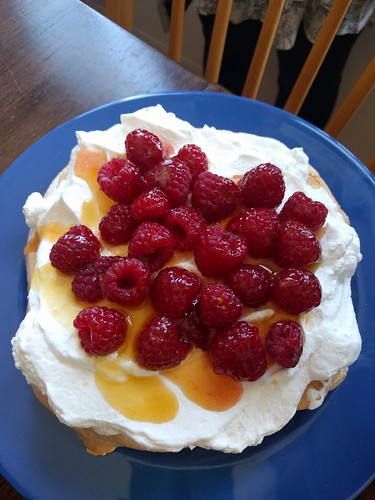
Posted in friends, history, politics, san francisco | Comments Off on thankful for
Wednesday, November 23rd, 2016
1. Neighbor Naomi had us over to sing Leonard Cohen songs. The pot-bellied stove makes her whole cottage toasty. She made roast chicken and we sang Suzanne and Dance Me to the End of Love. I love her so much.
2. Neighbor Michael made this.

3. I check in on people, and people check in on me. Text messages and phone calls, back and forth, sharing coping strategies and bewildered sorrow. I love them all so much.
4. I’m reading Paul Monette and Andrew Holleran and Amy Hoffman. I used to read WW2 histories and tell myself “at least it’s not WW2.” At least it’s not AIDS?
5. My mister, our daughters: we four.
Posted in grief, history, the end of all things | Comments Off on five fragments i have shored against my ruins
Tuesday, November 15th, 2016
Here’s what I’ve been reading and rereading this whole awful week:
‘These women walked directly into the fire and through it, and they did not have to. And that they did it even as some of the gay men they took care of treated them with bitchiness, scorn, and contempt.
‘It was, at the time, not at all unusual for gay men to snicker as the bull dyke walked into the bar with her overalls and flannels and fades. Much of the time, it was casual ribbing which they took in stride. But it could also be laced with acid, especially when lesbians began gravitating toward a bar that had until then catered largely to men.
‘When the AIDS crisis struck, it would be many of these same women who would go straight from their jobs during the day to acting as caregivers at night. Because most of them lacked medical degrees, they were generally relegated to the most unpleasant tasks: wiping up puke and shit, cleaning up houses and apartments neglected for weeks and months. But not being directly responsible for medical care also made them the most convenient targets for the devastating anger and rage these men felt – many who’d been abandoned by their own family and friends.
‘These women walked directly into the fire. They came to the aid of gay men even when it was unclear how easily the virus could be transmitted. Transmission via needlestick was still a concern, so they often wore two or three layers of latex gloves to protect themselves, but more than once I saw them, in their haste and frustration, dispense with the gloves so that they could check for fevers, or hold a hand that hung listlessly from the edge of a bed whose sheets they had just laundered.
‘They provided aid, comfort, and medical care to men withering away in hospices, men who’d already lost their lovers and friends to the disease and spent their last months in agony. They’d been abandoned by their own families, and were it not for lesbians – many if not most of them volunteers – they would have suffered alone. And when there was nothing more medicine could do for them and their lungs began to fill with fluid, it was often these same women who’d be left to administer enough morphine to release them, given to them by the doctor who had left the room and would return 15 minutes later to sign the certificate (a common practice at the time).
‘I knew a woman around that time who’d had at one point been making bank in construction. But at the outset of the AIDS crisis she had abandoned her career to pursue nursing instead, and was close to her degree when we were hanging out. She was a big, hearty drinker, and fortunately so was I. We’d been utterly thrashed at a bar once when someone whispered a fairly benign but nonetheless unwelcoming comment about her. Middle fingers were exchanged, and afterwards, furious and indignant, I asked her, Why do you do it? Why did you abandon a career to take care of these assholes who still won’t pay you any respect?
‘She cut me a surprisingly severe look, held it and said, “Honey, because no one else is going to do it.” I remember feeling ashamed after that, because my fury and indignation weren’t going to clean blood and puke off the floor; it wasn’t going to do the shit that needed to get done.
‘HIV killed my friends, took my lover from me, and tore up my life. During that time, I did what I could. But nothing I did then or have ever been called to do in my life puts me anywhere near the example set by the lesbians I knew in the 80s and 90s. I’ve felt obligated to remember what they did, and to make sure other people remember it too.’
Posted in grief, history, worldchanging | Comments Off on so: that happened
Saturday, September 24th, 2016
I started listening to Siddhartha Mukherjee’s The Gene: An Intimate History (having finished up Drew Gilpin Faust’s This Republic of Suffering, which traces the American way of death back to the Civil War, and is excellent.) Mukherjee’s Emperor of Maladies made me cry buckets and also gave me an inkling of insight when it described “cancer pathways” – specific sequences of gene mutations that lead to specific conditions.
I couldn’t wait for The Gene to come out and so far it’s even better than Emperor. He talks about his paternal uncles, Rajesh and Jagu, who suffered from bipolar disorder and schizophrenia, and how the trauma of Partition exacerbated their illnesses. This immediately after I read Timothy Knatchbull’s From a Clear Blue Sky about the Mountbatten bomb. The consequences of British imperialism run through both families like another inherited trait.
Mukherjee made me laugh out loud when he described Darwin resolutely ignoring the theological consequences of his research as the idea of evolution dawned on him, calling this “the separation of church and state of mind.”
I first encountered Darwin as a teenager in my Dad’s Stephen Jay Gould and Dawkins books, which sounded every bit as self-satisfied as the religious books I was reading at the same time. Darwin came back around later, long after I’d lost my faith, when I read Janet Browne’s wonderful biographies of him. She described how seriously he took his reading, and in response, I started keeping my own log of the books I had read.
As a devout Christian and then as an angry atheist, a lot of Darwin was lost on me. If you refuse to engage with the central struggle of his life, between his faith in meaning and what his observations taught him, you miss so much. I see in Darwin now what I saw in La Sagrada Familia in Barcelona: that this world is more beautiful than it needs to be; that even when you understand its underlying principles, its glory can bring you to your knees.
“There is grandeur in this view of life, with its several powers, having been originally breathed into a few forms or into one; and that, whilst this planet has gone cycling on according to the fixed law of gravity, from so simple a beginning endless forms most beautiful and most wonderful have been, and are being, evolved.”
Posted in bookmaggot, history, hope, i love the whole world, mindfulness, spain | Comments Off on darwinian
Sunday, August 7th, 2016
Last year it was lovely Lagrasse that granted all our wishes; this year it was Barcelona’s turn to give us the bathroom, parking space, wifi and hotel printer for which we collectively yearned. Mister Christopher was waiting for us in the hotel cafe, and he whisked us away to lunch at a nearby taverna, a meal that immediately eclipsed anything I had eaten in France (Vichysoisse, melon cream with jamón Ibérico, duck confit on mashed pumpkin, Crema Catalana.) Afterwards we walked to the Arc de Triomf, with an extended layover at a playground on the way and a pause to obtain excellent ice cream; through the park to El Born, the cast-iron-and-glass Victorian marketplace with Roman ruins in its basement (a long argument for Catalan nationhood); swiftly through the gorgeous Gothic Quarter to Flax & Kale for a very good dinner.
Today we met up with the Moores and visited La Sagrada Familia (another long argument for Catalan nationhood). I last saw the building in the 90s when it was roofless and bare, and I fell instantly and hopelessly in love with it. Since then it has been roofed over and consecrated. I walked through the doors in the Nativity façade, stopped dead and pretended I wasn’t blubbing. The rainbow stained-glass windows, the soaring, branching vaults, the curvilinear forms. It was like the first time I saw redwoods, or the kelp forest. A choir sang in my mind: O Holy Night, Gloria in Excelsis.

We spent hours in the basilica, climbing the towers in the Passion facade (Rowan: “Woah! This is AWESOME! Claire, Julia: look down!”) and exploring the museum in the crypt. I have to learn more about Gaudí and about the Catalans. When we had finally exhausted ourselves, we found a fantastic Extramaduran place around the corner for lunch (jamón Ibérico, tortilla de patata, pimientos de padrón, more paella than we could possibly eat). Christopher met us there and said: “So how was the cathedral?”
“It was okay.” I said, and we all looked at each other and started to laugh.
Posted in adventure time, friends, happiness, history, hope, i love the whole world, little gorgeous things, mindfulness, spain | Comments Off on homage to catalonia
Sunday, July 31st, 2016
The unexpected highlights of Paris this year were Sainte-Chapelle and the Pantheon. At the top of the servant’s stairs into Sainte-Chapelle I stopped for ten seconds, struck entirely dumb. A jillionty tonnes of stone are transformed into a soaring volume of space, filled with the rainbow light of stained glass. I knew the first part of the story from Waugh’s Helena and the True Cross: how Constantine’s mother had travelled to Jerusalem to find the relics of the Passion. I hadn’t known that Emperor Baldwin went broke and sold the Crown of Thorns and assorted True Cross bits to Saint Louis in the 13th century, and that Louis brought them to France. In doing so Louis was trying to combine spiritual and political power, heavenly and earthly crowns, and so the Sainte-Chapelle has the hybrid vigor of a place both sacred and imperial.
So too does the Pantheon, but the other way around. It was originally conceived as a church but consecrated, in the end, as a secular memorial to great men of the Republic. It has become another way for France to assert what it believes itself to be in the durable languages of stone and human remains. We took a tour around the dome and the view of Paris was beyond anything; between the Eiffel Tower and the Tour Montparnasse we saw a Montgolfier-style tethered balloon levitating its tourists. Down in the crypt we all separately found Marie Curie and were, to our mutual surprise, moved. She was interred there on her own merits, the first woman to be so honoured.

It’s what I meant when I talked about choosing our own ancestors: in my case, Saint Jane Austen, Saint Harvey Milk and Saint Octavia Butler. The future is a nation we build with our hope and the work of our hands. It derives its power from our beloved dead.
Posted in france, history, hope, mindfulness, politics, women are human, worldchanging | Comments Off on ashes and air
Thursday, July 28th, 2016
I realized just before our flight that we would be landing half way through the matinee for which we had tickets; proof if proof were needed of just how badly I needed a break. I called Grant and woke him at 1am to explain, and somehow by the time we landed he had cajoled the theatre into exchanging our cheap-ass matinee tickets for tickets to the evening performance. Grant’s impossible to describe. He’d be one of my favourite people on earth even if he hadn’t introduced me to Jeremy; as it is, he is responsible for most of the great joys of my life.
Our hotel was a stone’s throw from St Pancras. Grant met us there and took us to one of the restaurants on Battlebridge Place, the newly developed expanse of public space between St Pancras and Kings Cross. Miss Jo came to meet us and so did Kirsty, so there I sat in the warm evening with my kids and some of my dearest friends, my Mardi-Gras-and-Burning-Man-crossover friends, bewilderingly happy. Kirsty and her friend Sacha joined us for the show, Lin-Manuel’s other musical, In the Heights; great fun.
As we walked back to our hotel we stopped at the large birdcage covered in rainbow LEDs, and Julia swung on the swing inside.

The next morning we hit in quick succession the British Library Reading Room (pages from Leonardo’s journals, the Magna Carta, Jane Austen’s writing desk and Persuasion in her handwriting), the Wellcome Collection (Napoleon’s toothbrush) and – our overwhelming favourite – the Grant Museum of Zoology, with its quagga and thylacine skeletons and its dodo bones.
Still jetlagged, I dozed off on the Eurostar and woke having no idea what country I was in; southern England looks a lot like Northern France. I had slept through the Channel tunnel! Arriving in Paris by train is infinitely preferable to flying in. We took the Metro from Gare du Nord and walked from Odeon to our apartment.
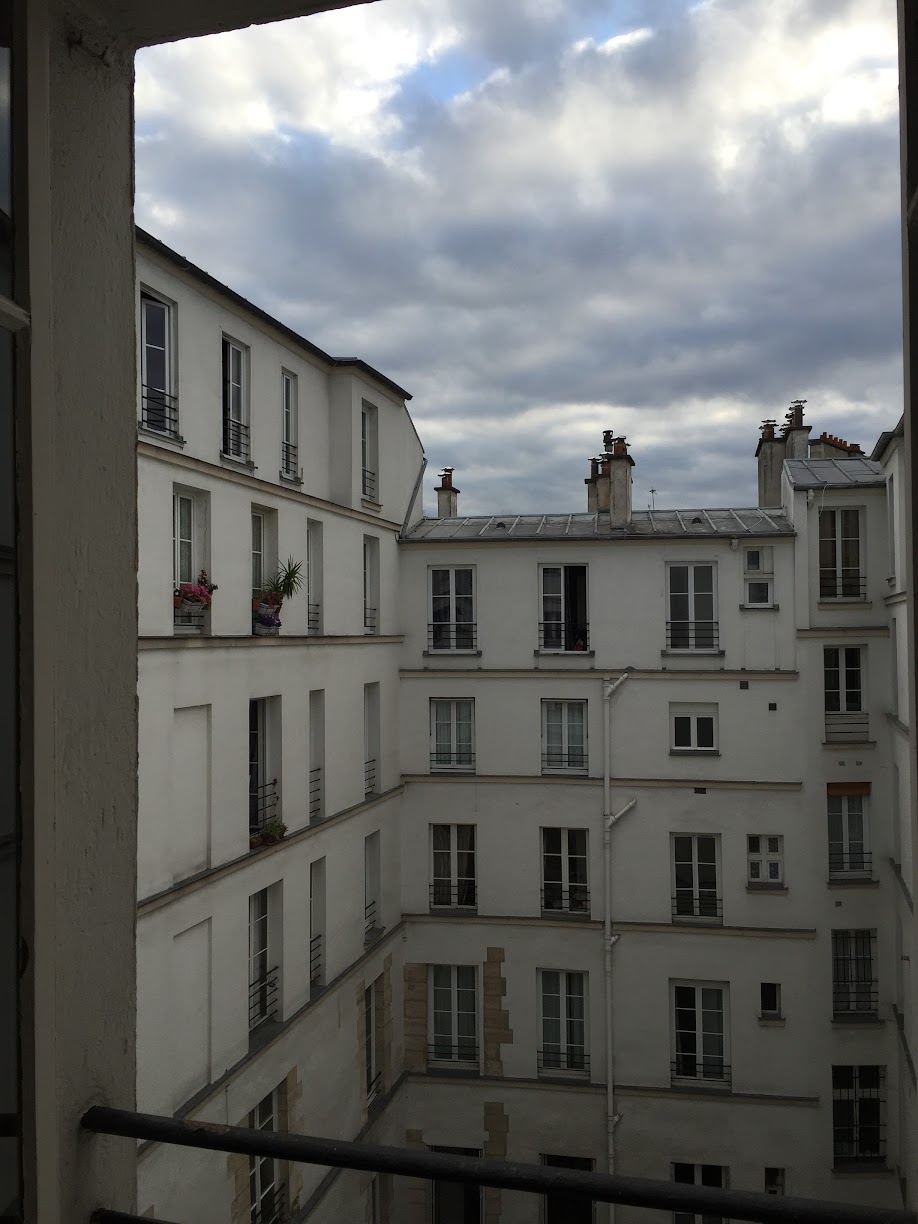

We travel like such nerds. Picking up where we left off last year in the Louvre, I noticed myself noticing things. Last year, feeling crosser, I was outraged at the self-congratulatory imperialism of places like the British Library and the Louvre. This year, humbler and more grateful, I thought: Yes, and; England and France robbed the world but in their museums, we-the-colonised can look at the things once kept only for our foreign kings. I love palaces made over into public spaces. I love the children in the Grant squealing over the jar of moles, and the black women among the Egyptian antiquities, their hair in cornrows exactly like the people in the friezes.
Posted in adventure time, england, france, happiness, history, hope, i love the whole world, little gorgeous things, mindfulness | Comments Off on grand tour
Friday, July 22nd, 2016
…the only way individuals can become sane about race is by plodding stubbornly on through the insanities.
Posted in grief, history | Comments Off on alive, alive oh, by diana athill
Friday, July 22nd, 2016
Hope, in this deep and powerful sense, is not the same as joy that things are going well, or willingness to invest in enterprises that are obviously headed for early success, but, rather, an ability to work for something because it is good, not just because it stands a chance to succeed.
Posted in history, hope | Comments Off on hope in the dark, by rebecca solnit
Friday, July 8th, 2016
I have rare blood, O neg, the universal donor. After Orlando I went to give blood and was turned away because my heart was racing (it was the day Jo Cox died; I wanted to say “Haven’t you read the news?” but the poor nurse was just looking out for me.) I’ve since had an EKG and everything’s fine with the ol’ ticker except, of course, that it’s broken. It was broken before Baton Rouge and Falcon Heights and Dallas; it’s shattered now. God in whom I can’t believe, please help this suffering country.
At the same time, I’ve been flattened by a vicious cold. All I can read is Helen Garner and Joan Didion and Diana Athill and this NYer piece on hospice, and all I can watch is Angels in America. It feels like 2005, when the black water drowned New Orleans, or 2003, when Baghdad burned. Baghdad’s still burning. I cling to these words of Roxane’s:
We have to do better than all this “the world is coming to an end.” The world is not coming to an end. The world is changing.
In whatever small way I can work towards justice and peace, let me work.
Posted in grief, history, mindfulness, politics, ranty, sanity, worldchanging | Comments Off on o negative
Monday, June 27th, 2016
- Have I really not blogged in three weeks? Oh well it’s not like anything of local or world-historical importance has happened HAHAHAHA dear god
- I can’t really bring myself to say anything about Orlando or the assassination of Jo Cox except that AR-15s and high-capacity magazines should have been banned years ago, and all the lobbyists and politicians who have prevented this are little better than murderers themselves.
- While I was trying to have a Saturday afternoon nap, much interrupted by sirens, a fire took out most of a block in the heart of our neighborhood, including our beloved local hardware store. We used to shop there even before we moved to Bernal. Several times a day I look at something that needs fixing around the house and have a muscle-memory of buying its replacement at Cole Hardware. All our neighbors got out in time, which is a great mercy.
- I had an almost-perfect day at work on Thursday, then came home only to grow increasingly distressed over Brexit, which broke my Judtist heart. David Cameron’s decision to hold the referendum now replaces Bush’s invasion of Iraq as the most appalling error of judgment committed by any English-speaking politician in the course of my adult life. Europe is important. Bureaucracies may seem boring and idiotic but they are inexpressibly less boring and idiotic and catastrophic than the world wars that they occasionally, through the great efforts of many kind people and with considerable good luck, replace.
- All of this and a lot of other stories that are not mine to tell have made the last few months very difficult, but there have been fierce joys as well: Hillary and Warren campaigning together; the enduring wonderfulness of Ginsberg and Sotomayor; the memory of my mother pouring out all her tremendous capacity for love in her last days, and the knowledge that her example will be with me for the rest of my life.
Posted in england, grief, history, hope, mindfulness, politics, ranty, worldchanging | Comments Off on friday five, but on a monday
Friday, May 27th, 2016
…the primary national interest is physical occupation, and science is the loophole through which the necessary infrastructure can emerge.
Posted in history, ranty, worldchanging | Comments Off on big dead place, by nicholas johnson
Friday, May 27th, 2016
If there was no war then thousands of Aborigines were murdered in a centurylong, continent-wide crime wave tolerated by government. There seems to be no other option. It must be one or the other.
Posted in australia, bookmaggot, grief, history | Comments Off on forgotten war, by henry reynolds
Friday, May 27th, 2016
Ronan already knew he was a weapon; but he was trying to make up for it.
Posted in bookmaggot, grief, history | Comments Off on the raven king, by maggie stiefvater
Saturday, May 14th, 2016
A fresh new irony in my life is that I have become fascinated with Aboriginal rock engravings, 20 years after leaving Sydney where they are present in magnificent abundance, 25 years after graduating from the Department of Archaeology where John Clegg taught and a year after John Clegg’s death. I never could see the precious things that were right in front of my face.
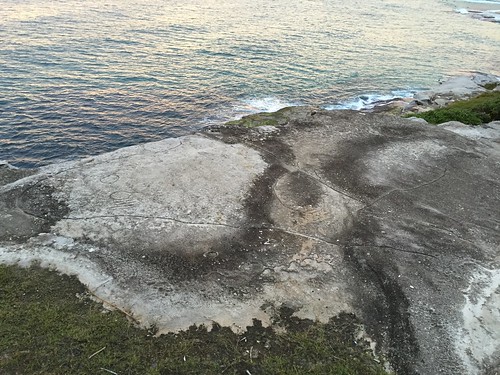
This one’s a little hard to make out, but it’s a whale shark, its nose pointing to the left, two eyes on the white patch of rock, and a fish inside it, its nose pointing down. It’s on the cliffs above Tamarama, on the spectacular walking path from Bondi to Coogee. We walked up there one late afternoon as the sun set behind the city and set the sky on fire.
The next two turned out beautifully – we found them at blazing high noon – but the shaming part is, they are part of an incredibly rich field that is walking distance from my childhood home, on a track I regularly wandered down, but I didn’t even notice that they were there until shortly before I left the country for good. They weren’t signposted as they are now, but also, I just wasn’t paying attention.
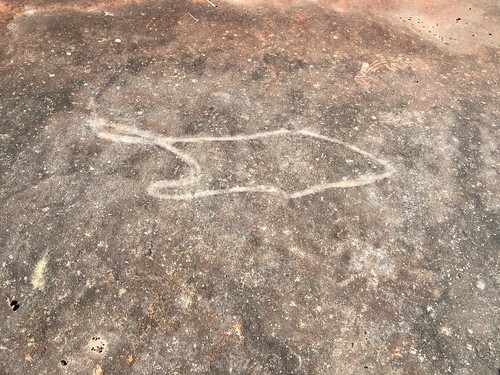
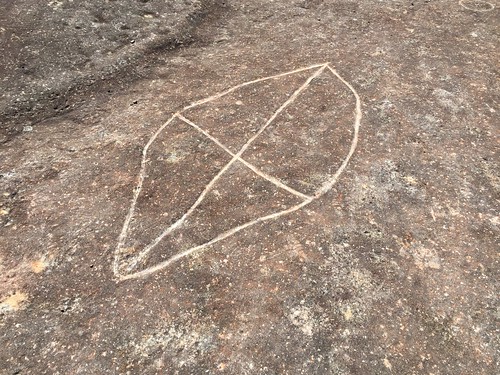
I remember a visitor from England saying very snottily that he couldn’t live in Australia because there wasn’t enough history here, compared with where he grew up. I wish I’d known enough to drag him to this place and point out that the people who made this art lived peacefully on this land for 40,000 years before there even was an England.
Murri stockman Herb Wharton wrote:
The old tribal elder who had spoken before said that he did not trust people who could leave the place where they had been born, to go to another country. For him, for all of them, their land was their mother, a sacred place. No matter what injustices they had suffered, nothing could ever break that tie with their own land and with the Dreamtime. Yet every one of this boat mob had left his own land.
I am boat mob twice over – my English mother, my exile self.
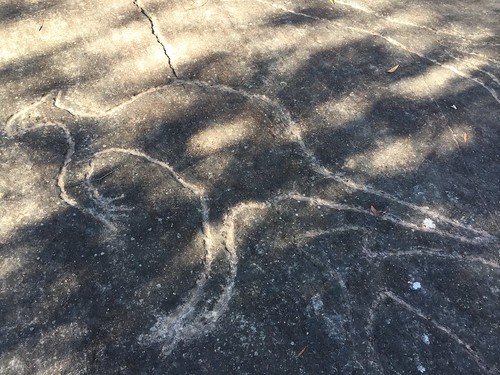
This site was the hardest to find and the most beautiful. Again, it was a few metres off a bush track I knew well, where I used to let my Arab horse Alfie stretch out and gallop; almost exactly halfway between my godmother’s house and that of Jeremy’s Aunty Jan. The kids were incredibly patient as I searched and searched for the obscured beginning of the footpath, and uncomplaining about the spiky grass and prickles they endured along its length. When we finally found the site it was as obviously holy a place as any church.
It’s believed to celebrate a successful hunt; that’s a spear between the kangaroo’s shoulder blades. I think your family of choice includes ancestors of choice as well. You choose which writers and painters and musicians and activists you want to emulate, and which you don’t. I recognize the people who made these images and the people who work to protect them. I acknowledge them as parts of myself, debts to ancestors I never knew, a motherland that will not leave me no matter how often I leave it.
Posted in australia, history, little gorgeous things | Comments Off on ancestors





